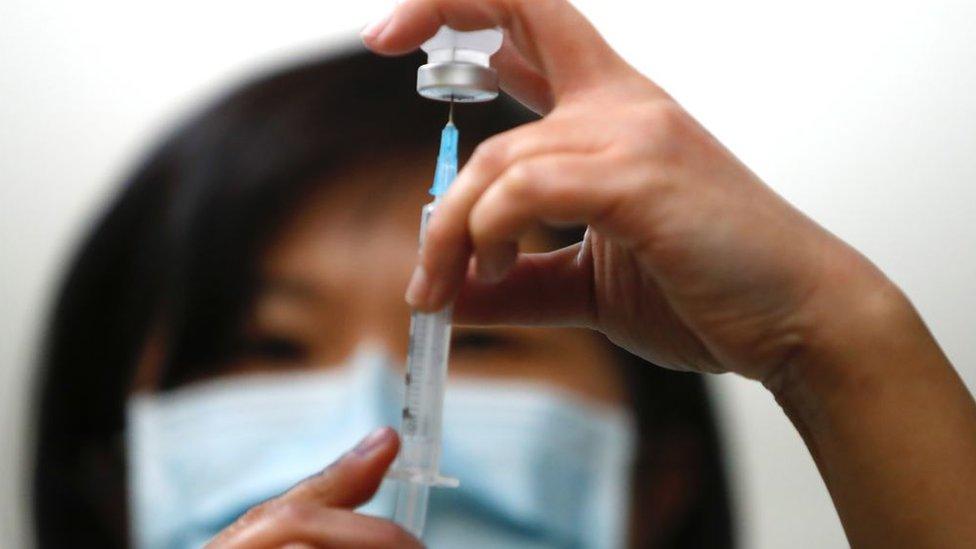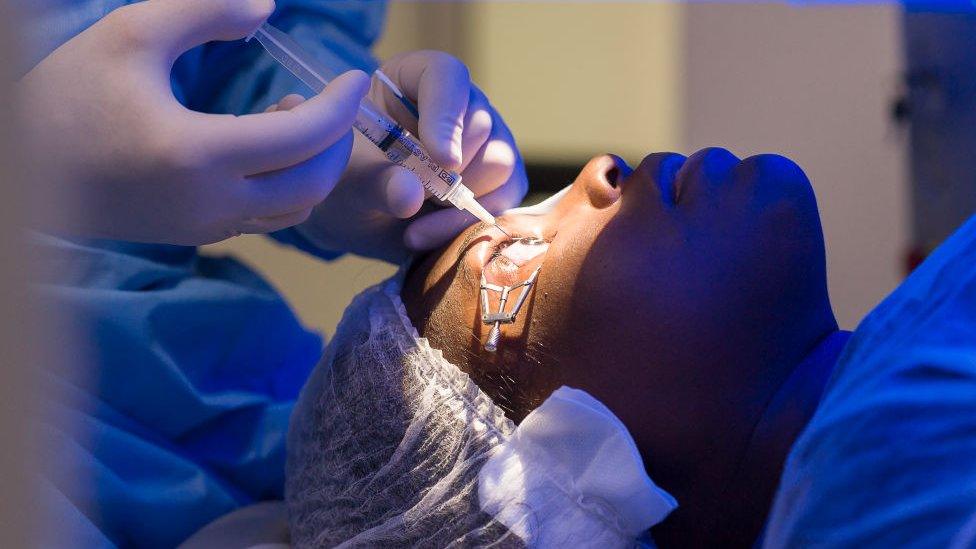Wolverhampton locum's new glasses contributed to patient harm - report
- Published

The trust said a number of patients were found to have received sub-standard treatment
A doctor's new glasses could have contributed to more than 100 patients being left with eye damage, a report has found.
The 103 patients suffered lens damage after being given intravitreal injections by the locum at New Cross Hospital in Wolverhampton.
The consultant's new glasses caused a change in injection technique.
The NHS trust said procedures had been amended to prevent it happening again.
Artist Margaret Kitching was among those who suffered harm after being given injections to treat a rare eye condition.
During the treatment the ophthalmologist pierced the lens of her left eye, she was told.
Mrs Kitching, from Wolverhampton, said: "My eyesight is an important tool of my job, and I don't know whether the long-term impact of this treatment will mean I can no longer produce my art.
"It's been an awful experience and has caused me - and I'm sure many others - a huge amount of stress."
She is now pursuing a clinical negligence case against the Royal Wolverhampton NHS Trust, which carried out a recall of the locum's patients in December 2021.
'Dire results'
An investigation, shared with patients, states the consultant, who started treating NHS patients at the hospital in October 2021, had been wearing new varifocal spectacles when carrying out treatments.
Jordan Higgs, a legal executive from the clinical negligence team at FBC Manby Bowdler, is supporting Mrs Kitching along with several other affected patients.
Mr Higgs said: "She [the locum] described the glare from the lighting in the treatment rooms as too bright and, in an attempt to reduce the effects of the glare, she changed the patients' head position when injecting.
"This was a change from usual practice and appears to have had dire results."
A review team found the lighting in the treatment room was satisfactory.

An internal investigation found 103 out of 341 patients suffered lens damage
A Root Cause Analysis (RCA) report detailing the investigation, stated 103 out of 341 patients treated by the consultant had suffered damage to the lens of the eye.
Eight of them had damage to both eyes.
The report concluded subtle damage could have been caused at previous appointments by other staff although "most likely" the lens damage was caused by the operator.
An external reviewer looked at the records of 23 patients and concluded in eight cases the damage was definitely related to the consultant.
Investigators assessed a random cohort of 100 patients treated by other doctors and none had lens damage, the report states.
"This makes it even more shocking that such a poor outcome was achieved for so many patients," added Mr Higgs.
An intravitreal injection puts medication directly into the space in the back of the eye called the vitreous cavity, he explained.

The patients suffered lens damage after being given injections for eye conditions
In a letter to the legal firm, the trust said it had apologised to Mrs Kitching for the substandard care that she received.
The report concluded the trust's processes for recruitment, induction and supervision of the practitioner were robust and all procedures were followed.
Dr Brian McKaig, chief medical officer at The Royal Wolverhampton NHS Trust, said it had become aware of an issue regarding a procedure carried out by a locum consultant in October 2021.
"We immediately suspended the practice of the consultant whilst an internal investigation was carried out.
"Following this investigation, we commissioned an external review and a number of patients were recalled and found to have received sub-standard treatment.
"They have now all had a clinical review and, where necessary, have either undergone - or will undergo - appropriate treatment."

Follow BBC West Midlands on Facebook, external, Twitter, external and Instagram, external. Send your story ideas to: newsonline.westmidlands@bbc.co.uk, external
Related topics
- Published18 January 2023

- Published5 April 2022
